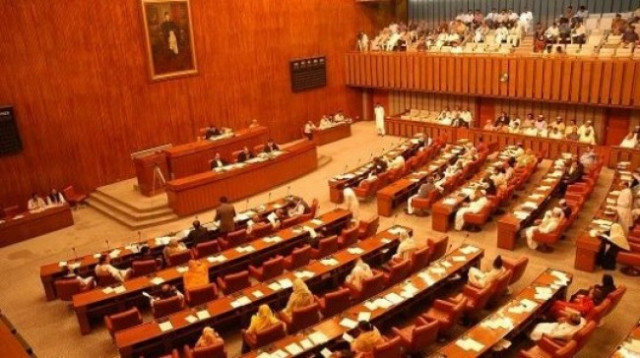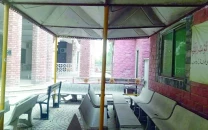Once a week: PM bound to attend Senate sessions
Upper House amends rules amidst walkout by opposition.

Rule 61 (2A) of the rules of the Senate’s Procedure and Conduct of Business says that the prime minister would have to appear in the Senate at least once a week when the house is in session. PHOTO: FILE
The Senate on Monday adopted a resolution requiring the prime minister to attend the session at least once a week. According to the amendments made in the house rules, the prime minister shall, whenever possible, personally respond to points raised by members when he is present in the House.
MQM Senator Col (retd) Syed Tahir Hussain Mashhadi sought to rename the ‘Zero Hour’ – referring to a 30-minute segment at the end of the session in which members may ask any question of national importance without prior notice – the ‘Prime Minister’s Zero Hour’. Under the amendment, the premier is required to attend this Zero Hour at least once a week.

The amendment to the Rules of Procedure and Conduct of Business 2012 was proposed by Senator Mashhadi and supported by a majority of the senators, with the exception of those belonging to the Pakistan Muslim League-Nawaz (PML-N).
Rules 61, 64, 169 and 178 were amended in Monday’s session. Rule 61 (2A) of the rules of the Senate’s Procedure and Conduct of Business says that the prime minister would have to appear in the Senate at least once a week when the house is in session.
The 103rd session of the upper house of parliament witnessed heated arguments and opposition members staged a walkout to protest comments by PML-N Senator Jaffar Iqbal regarding the presence of the prime minister in the Senate.
Iqbal said the country is facing many challenges which the prime minister is busy dealing with and his presence in the house is not important. PPP Senator Raza Rabbani responded that Iqbal’s comments contravened the dignity of the house and it is the premier’s responsibility to attend the session.

Leader of the House Raja Zafarul Haq said that as more than one amendment had been proposed and the issue was a matter of importance, there should either be consensus on the issue or the matter would be referred to a special committee. Leader of the opposition Aitzaz Ahsan, who was present during Monday’s session after skipping several previous sessions, said that the matter should be opened to debate.
Deputy Chairman Sabir Ali Baloch called for a vote. The opposition’s walkout thus ended as members unanimously supported the vote. Senators from the Jamiat Ulema-e-Islam-Fazl (JUI-F) and the MQM, from the treasury benches, also supported the call to vote, leaving the PML-N senators as the lone voice of dissent.
Following the vote, there was confusion amongst the opposition benches about whether the amendments had been taken into consideration; the deputy chairman was unable to clarify the issue. However, the air was cleared by Senator Rabbani, who explained that according to Rule 269, the motion under consideration had already been carried out and the government benches had thus missed the opportunity to refer the matter to a select committee. The amendments to the Senate rules were thus passed.
“The Constitution gives the right to both houses of parliament to form rules for their procedure,” Senator Mashhadi told The Express Tribune. “By the insertion of this amendment, the PM is now legally bound to answer to the Senate.” The proposed amendment was based on the British parliamentary system.
Earlier, Senate Chairman Nayyer Hussain Bukhari gave a day’s deadline to the leader of the house, Raja Zafarul Haq, to bring the Internal Security Policy into the Senate after he had promised to do so before the last session was prorogued. Haq said he would do so at the earliest but was rebuked by the chairman, who said, “Is the house not dignified enough?” Bukhari warned that a failure to present the security policy in the Senate would lead to the matter being referred to the relevant committee.
A resolution moved by Senator Afrasiab Khattak of the ANP demanded that the government prepare a plan to ‘cleanse’ Fata of militants, compensate victims of militancy and provide relief to the internally displaced people.
The resolution was accepted, while the States and Frontier Regions (SAFRON) minister, Lt Gen (retd) Abdul Qadir Baloch said the government had a ‘martial plan’ to include Fata within the mainstream; he said the compensation package as well as monetary assistance for IDPs would be increased.
Published in The Express Tribune, April 15th, 2014.



















COMMENTS
Comments are moderated and generally will be posted if they are on-topic and not abusive.
For more information, please see our Comments FAQ